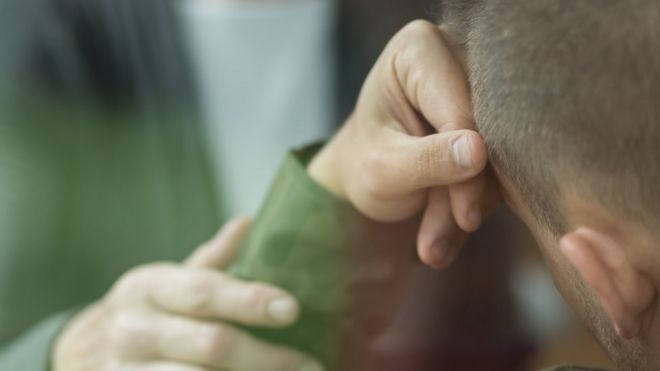
Image copyrightKatarzynaBialasiewicz
Penis transplant plans for wounded US veterans
Surgeons are set to carry out the first penis transplant in the United States, in a bid to help wounded war veterans.
The 12-hour operation will involve stitching key nerves and blood vessels to restore urinary - and ultimately - sexual function.
It follows the world's first successful penis transplant, in South Africa, last year.
The team at Johns Hopkins University (JHU) plan to operate on 60 veterans as part of a trial.
The operation
The first procedure will involve a penis donated by a young deceased donor, with his family's permission.
And according to the team at JHU the hope for the veteran is that sensation will return within six to 12 months.
Depending on the extent of the injury and success of the operation, there is a chance patients will be able to father their own children.
But scientists say as only one successful transplant has taken place before, they will take care to ensure there are realistic expectations.
Like other major transplant surgery the operation carries risks, such as infections or bleeding during the procedure.
And the side-effects of taking life-long anti-rejection drugs will need to be weighed up too.
Patients will also be screened extensively to make sure they can cope with the psychological impacts of surgery.
There have been concerns with other complex operations - hand and face transplants for example - that patients may find it difficult to accept the donated organs as their own.
Carisa Cooney, clinical research manager at JHU, said the team had spent many years preparing for the operations and discussing the ethical issues.
She added: "For the right patients this can really improve their quality of life and help them re-enter society."
War wounds
Veterans will be monitored for five years and scientists will gather evidence to consider whether transplants should be offered more widely.
Recent research involving young military personnel suggests 7% suffer genital injuries in combat.
Many are due to blast injuries from improvised explosive devices which are being increasingly deployed.
And though protective gear exists, researchers say some soldiers choose not to wear it as it can get in the way of them moving around quickly.
Future generations
Only two other penis transplants have previously been reported.
One took place in China in 2006. Accounts suggested the operation went well, but the penis was later rejected.
The other operation took place in South Africa, involving a young man who had been left with just 1cm of his original penis as a result of a botched circumcision.
His medical team said there was extensive discussion about whether the operation, which is not life-saving in the same way as a heart transplant, was ethical.
Recent reports suggest the transplant was successful and he has had a child.
 Medicine, Psychology and Physiology
Medicine, Psychology and Physiology